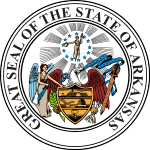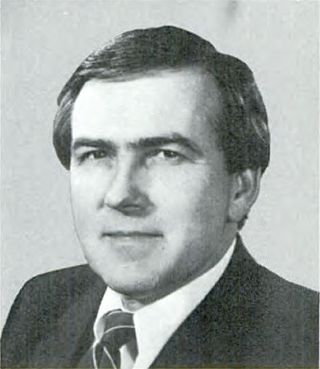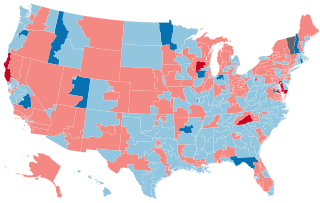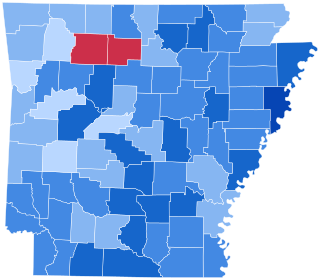| |||||||||||||||||
| |||||||||||||||||
 County results | |||||||||||||||||
| |||||||||||||||||
| Elections in Arkansas |
|---|
 |
The 1924 United States Senate election in Arkansas took place on November 4, 1924. Incumbent Democratic Senator Joseph Taylor Robinson was re-elected to a third term in office over Republican Charles F. Cole.
| |||||||||||||||||
| |||||||||||||||||
 County results | |||||||||||||||||
| |||||||||||||||||
| Elections in Arkansas |
|---|
 |
The 1924 United States Senate election in Arkansas took place on November 4, 1924. Incumbent Democratic Senator Joseph Taylor Robinson was re-elected to a third term in office over Republican Charles F. Cole.
| Party | Candidate | Votes | % | |
|---|---|---|---|---|
| Democratic | Joseph T. Robinson (incumbent) | 100,408 | 73.52% | |
| Republican | Charles F. Cole | 36,163 | 26.48% | |
| Total votes | 136,571 | 100.00% | ||

Joseph Taylor Robinson, also known as Joe T. Robinson, was an American politician from Arkansas. A member of the Democratic Party, he represented Arkansas in the United States Senate from 1913 to 1937, serving for four years as Senate Majority Leader and ten as Minority Leader. He previously served as the state's 23rd governor, and was also the Democratic vice presidential nominee in the 1928 presidential election.

Tommy Franklin Robinson is an American businessman, lobbyist, and politician who served as the U.S. representative for Arkansas's 2nd congressional district from 1985 to 1991. He is a member of the Republican Party. Before he was elected to Congress, Robinson was the sheriff of Pulaski County.

The 1990 United States House of Representatives elections was an election for the United States House of Representatives on November 6, 1990, to elect members to serve in the 102nd United States Congress. They occurred in the middle of President George H. W. Bush's term. As in most midterm elections, the President's Republican Party lost seats to the Democratic Party, slightly increasing the Democratic majority in the chamber. It was a rare instance, however, in which both major parties lost votes to third parties such as the Libertarian Party as well as independent candidates.

The 1912–13 United States Senate elections were held on various dates in various states. They were the last U.S. Senate elections before the ratification of the Seventeenth Amendment in 1913, establishing direct elections for all Senate seats. Senators had been primarily chosen by state legislatures. Senators were elected over a wide range of time throughout 1912 and 1913, and a seat may have been filled months late or remained vacant due to legislative deadlock. Some states elected their senators directly even before passage of Seventeenth Amendment. Oregon pioneered direct election and experimented with different measures over several years until it succeeded in 1907. Soon after, Nebraska followed suit and laid the foundation for other states to adopt measures reflecting the people's will. By 1912, as many as 29 states elected senators either as nominees of their party's primary or in conjunction with a general election.

The 1934 United States Senate elections in Arizona took place on November 3, 1934. Incumbent Democratic U.S. Senator Henry F. Ashurst ran for reelection to a fifth term, defeating Republican nominee Joseph Edward Thompson in the general election by a wide margin.

The 1928 United States presidential election in Massachusetts took place on November 6, 1928, as part of the 1928 United States presidential election, which was held throughout all contemporary 48 states. Voters chose 18 representatives, or electors to the Electoral College, who voted for president and vice president.

The 1928 United States presidential election in Vermont took place on November 6, 1928, as part of the 1928 United States presidential election which was held throughout all contemporary 48 states. Voters chose four representatives, or electors to the Electoral College, who voted for president and vice president.

The 1920 United States presidential election in Arkansas took place on November 2, 1920, as part of the 1920 United States presidential election in which all 48 states participated. State voters chose nine electors to represent them in the Electoral College via a popular vote pitting Democratic nominee James M. Cox and his running mate, Assistant Secretary of the Navy Franklin Roosevelt, against Republican challenger U.S. Senator Warren G. Harding and his running mate, Governor Calvin Coolidge.

A general election was held in the U.S. state of Arkansas on November 4, 2014. All of Arkansas' executive officers were up for election as well as a United States Senate seat, and all of Arkansas' four seats in the United States House of Representatives. Primary elections were held on May 20, 2014, for offices that need to nominate candidates. Primary runoffs, necessary if no candidate wins a majority of the vote, were held on June 10, 2014.

The 1928 United States Senate election in Montana took place on November 6, 1928. Incumbent United States Senator Burton K. Wheeler, who was first elected to the Senate in 1922, ran for re-election. After successfully defeating several challengers in the Democratic primary, Wheeler advanced to the general election, where he faced Republican nominee Joseph M. Dixon, the former Governor of Montana who had previously served in the United States Senate from 1907 to 1913. Though the election was closer than Wheeler's first election, he still managed to defeat Dixon to win his second term in the Senate.

The 1928 United States presidential election in New Hampshire took place on November 6, 1928, as part of the 1928 United States presidential election which was held throughout all contemporary 48 states. Voters chose four representatives, or electors to the Electoral College, who voted for president and vice president.

The 1930 United States Senate election in Arkansas took place on November 4, 1930. Incumbent Democratic Senator Joseph Taylor Robinson was re-elected to a fourth term in office. He defeated Tom W. Campbell in the Democratic primary.

The 1928 United States presidential election in Maine took place on November 6, 1928, as part of the 1928 United States presidential election which was held throughout all contemporary forty-eight states. Voters chose six representatives, or electors to the Electoral College, who voted for president and vice president.

The 1936 United States Senate election in Arkansas took place on November 3, 1936. Incumbent Democratic Senator and Senate Majority Leader Joseph T. Robinson was re-elected to a fifth term in office. He defeated two Democratic opponents in the primary election and then dispatched Republican G.C. Ledbetter in the general election.

The 1928 United States presidential election in South Carolina took place on November 6, 1928, as part of the 1928 United States presidential election which was held throughout all contemporary 48 states. Voters chose 9 representatives, or electors to the Electoral College, who voted for president and vice president.

The 1924 United States presidential election in Arkansas was held on November 4, 1924, as part of the 1924 United States presidential election. State voters chose nine electors, or representatives to the Electoral College, who voted for President and Vice-President.
The 1946 Massachusetts general election was held on November 5, 1946, throughout Massachusetts. Primary elections took place on June 18.

The 1928 United States presidential election in West Virginia took place on November 6, 1928, as part of the 1928 United States presidential election which was held throughout all contemporary 48 states. Voters chose eight representatives, or electors to the Electoral College, who voted for president and vice president.

The 1928 United States presidential election in Iowa took place on November 6, 1928. All contemporary 48 states were part of the 1928 United States presidential election. Voters chose 13 electors to the Electoral College, which selected the president and vice president.

The 1928 United States presidential election in Mississippi took place on November 6, 1928, as part of the wider United States presidential election. Voters chose 10 representatives, or electors, to the Electoral College, who voted for president and vice president.